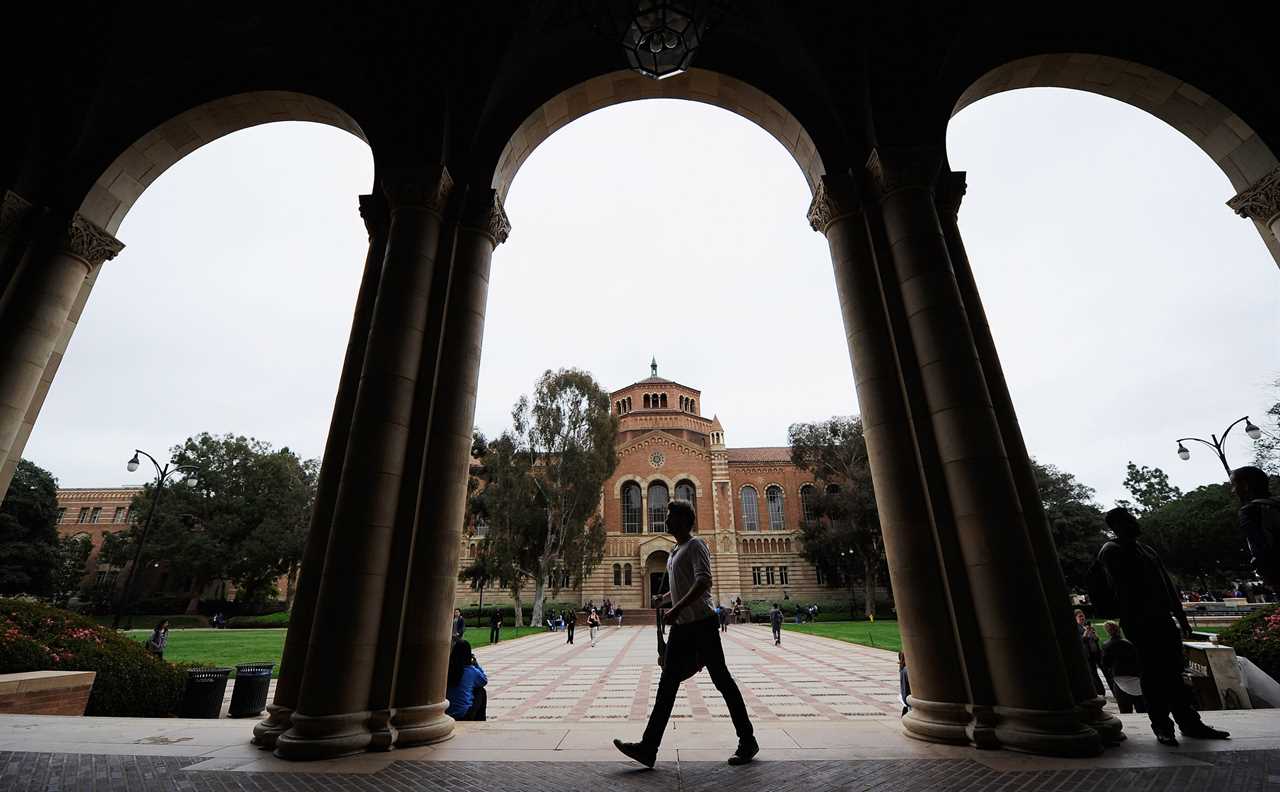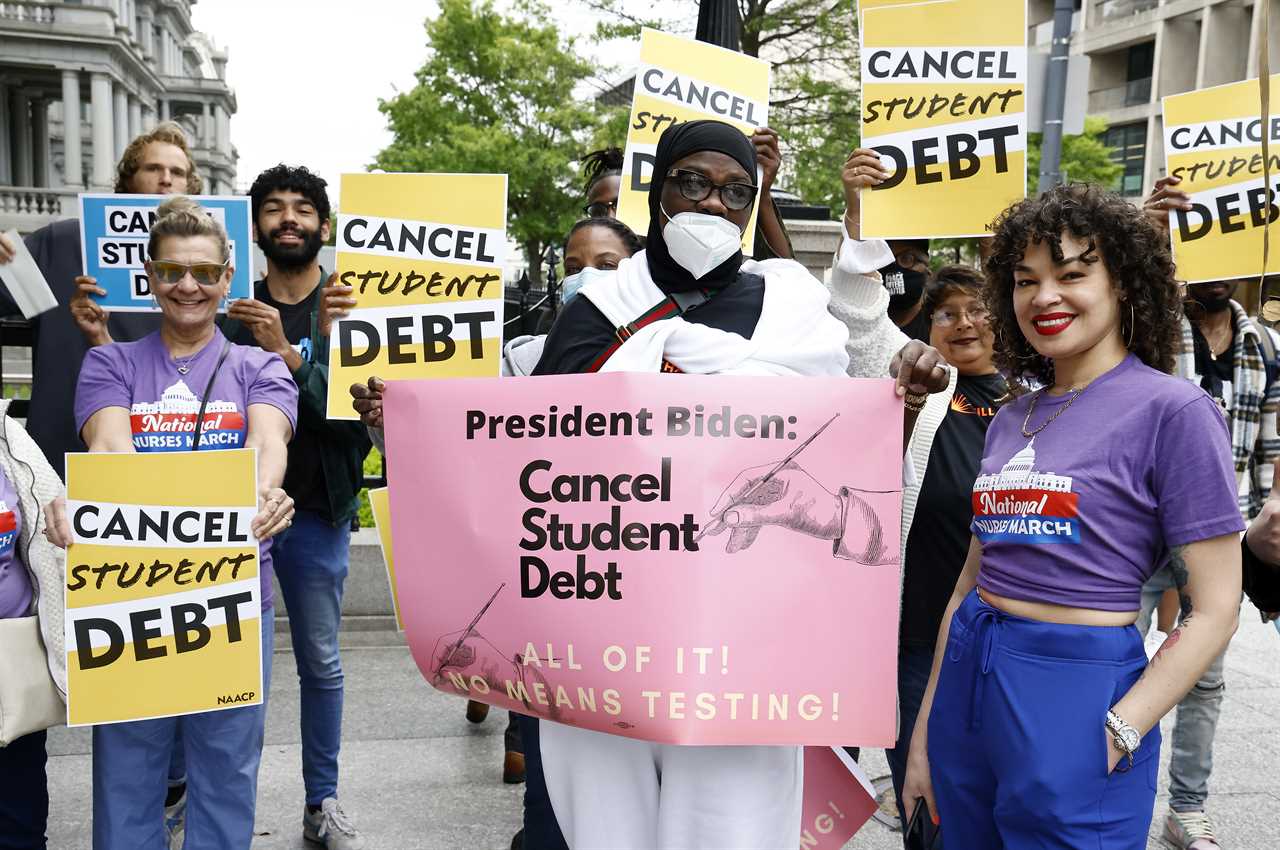
President Joe Biden’s advisers are looking at ways to limit student loan forgiveness based on borrowers’ income to avoid sending benefits to higher-earning Americans. But that approach is already angering progressives and could be a nightmare to implement before the November elections.
The first hurdle is within Biden’s own administration, where Education Department officials have privately raised concerns about the complexity of adding an income test to student loan forgiveness. They’re warning the White House that the agency lacks the data to automatically cancel loans based on a borrower’s earnings, according to three people familiar with the discussions.
As Biden weighs a final decision on canceling “some” amount of federal student loan debt — a major priority for progressives — his aides have been working on proposals that would target the relief to certain borrowers, such as those earning less than $125,000 per year.
Those potential income limits are aimed at fending off criticism that across-the-board loan forgiveness would benefit some Americans with higher incomes who don’t need the help. But imposing income caps may carry other potential risks for the Biden administration, especially if the Education Department is unable to swiftly execute on whatever loan forgiveness Biden might announce in the coming weeks.
An Education Department spokesperson, speaking on condition of anonymity, said in a statement that the agency “continues to assess its options for implementing broad debt cancellation by executive action.”
The Education Department doesn’t have individual income information for most of the 45 million Americans who have federal student loans.
The Internal Revenue Service has relied on Americans’ prior-year tax information to dole out benefits tied to income, such as stimulus checks and Democrats’ expanded Child Tax Credit payments. The Education Department, by contrast, does not have access to that trove of income data. Federal law tightly restricts how the IRS can share taxpayer information with other agencies.
The result, Education Department officials have concluded, is that the agency is unable to cancel federal student loans based on a borrower’s income level without requiring some action from the borrower. Department officials have told the White House they would need to set up some sort of application process to determine whether borrowers qualify for relief, according to the people familiar with the discussions.
That added layer of bureaucracy would likely take longer for the Education Department to implement compared with across-the-board forgiveness, and it would mean that borrowers would miss out on the benefit if they don’t know to sign up or apply for it.
“The landmines on this are everywhere,” said Bryce McKibben, former senior policy adviser to Sen. Patty Murray (D-Wash.) on the Senate Health, Education, Labor and Pensions Committee, who likened the looming implementation challenges at the Education Department to the Obama administration’s disastrous rollout of HealthCare.gov.
“Their options are: an income cap and political train wreck — or no income cap and broader, automatic-based relief for everyone. There's not a lot in between,” said McKibben, who is now senior director of policy and advocacy at the Hope Center for College, Community, and Justice at Temple University.
“Millions of borrowers would likely be shut out of the system based on an application requirement,” particularly the lowest-income borrowers and most distressed borrowers, he said. “People are going to fall through the cracks, and those people are going to be very mad and they're not going to turn out to vote in the fall.”
“There is an ongoing policy discussion and process” on Biden’s plans for student loan debt, a White House spokesperson said on condition of anonymity, adding that the administration “is continuing to assess options for cancellation.”
Beyond the implementation challenges of imposing income caps, the White House would also face blowback from progressives who have been calling on the administration to pursue a universal relief program.
Student debt activists on Thursday again rallied outside the White House calling on Biden to go big on canceling student loan debt. The NAACP, which organized the rally, believes that “canceling $10,000 is not enough, and means-testing is simply unacceptable,” Wisdom Cole, the organization’s national director of youth & college, said in a statement.

Rep. Mondaire Jones (D-N.Y.) said it would be a “terrible” idea for the White House to limit student loan relief based on borrowers’ income.
“We don't means-test K through 12 education. We don't means-test Social Security. We don't means-test Medicare. It's why those programs are broadly popular,” Jones said. “And people who are wealthy tend not to have student debt, it turns out. I don't think we should be creating an opportunity for people of bad faith to stigmatize yet another program as only being for poor people.”
Rep. Ayanna Pressley (D-Mass.), who has called canceling student loan debt a racial justice issue, said that while she’s encouraged Biden seems poised to take action she wants to make sure that the relief is “broad-based.”
“Ultimately, we need to alleviate the burden for anyone who is burdened by this debt,” Pressley said. “We should be focused on what is the most impactful and will reach as many people as possible.”
Student loan forgiveness is especially popular among Democratic voters and younger voters, according to an April POLITICO/Morning Consult poll, which found that more than three-quarters of GenZers and Millennials wanted to see at least some federal student loan forgiveness. Among all voters overall, 62 percent supported forgiveness of at least some federal student loan debt, with 29 percent, including half of Republican voters, completely opposed, according to the poll.
Any mass cancellation of federal student loans would present an unprecedented task for the Education Department, which has never forgiven debts at the scale that the White House is considering. The agency would have to figure out, for example, how to apply any loan forgiveness to tens of millions of borrower balances, which typically consist of multiple loans at different interest rates.
But adding an income test would be a considerably more difficult undertaking, according to current and former department officials as well as outside experts.
Another potential pitfall: A crush of borrowers all at once seeking to find out whether they’re eligible for some loan forgiveness could also overwhelm the call centers of the Education Department’s contracted loan servicers, who have reduced staffing over the last two years since most federal loan repayments have been frozen.
When the Biden administration expanded an existing loan forgiveness program for public service workers last year, the Education Department had to publicly ask borrowers to stop flooding servicer phone lines because of increased calls.
Scott Buchanan, executive director of the Student Loan Servicing Alliance, which represents the companies hired by the Education Department to manage student loans, said it would be “very difficult if not impossible” for the department and loan servicers to implement a sweeping loan forgiveness program before the midterm election, regardless of how it’s structured.
“It would be easier, but obviously far more unfair, to provide blanket treatment for everyone,” Buchanan said.
Education Department officials are planning for different scenarios based on how the White House decides to structure the details of any loan forgiveness program involving income caps.
One option officials are exploring is a self-attestation process in which borrowers simply certify that their income qualifies them for relief, according to the people familiar with the agency’s planning. That would likely be the fastest way for the department to determine who is eligible, though it would raise questions about the government’s ability to verify the information.
Another possibility is for the Education Department to rely on an existing agreement with the IRS that allows borrowers to electronically access their own federal tax information and then automatically input it onto a department application. But that process would not work for borrowers who don’t file taxes.
The Education Department is in the yearslong process of implementing a 2019 law, known as the FUTURE Act, that eased some restrictions on the agency’s access to IRS information to make it easier for people to apply for federal financial aid or enroll in income-driven repayment plans.
But even when fully implemented, that law still requires individuals to affirmatively opt-in to have the IRS share their taxpayer information with the Education Department — a safeguard that was included to address concerns from some lawmakers about the flow of confidential taxpayer information across the government.
On the campaign trail in 2020, Biden backed the idea of forgiving $10,000 per borrower. Since taking office, though, he has been reluctant to flex his executive authority in unprecedented ways to cancel student debt, and he’s publicly questioned whether he has the power to do so.
That calculation appears to have changed at the White House in recent months. Biden in April said he was “taking a hard look” at canceling “some” amount of debt. White House press secretary Jen Psaki said Biden wants that loan forgiveness to be “targeted to those graduates who have the greatest need.”
Republicans, meanwhile, are mobilizing against Biden’s efforts to cancel student loans. GOP lawmakers have introduced legislation to block some of the Education Department’s powers to forgive or suspend student loan payments.
“Student loan socialism would be a giant slap in the face to every family who sacrificed to save for college, to every graduate who paid their debt, to every worker who made a different career choice so they could stay debt free,” Senate Minority Leader Mitch McConnell said last week.
While Republicans may not have the power to block any loan forgiveness, GOP control of the House or Senate next year would empower the party to aggressively oversee how the Education Department implements any debt relief program.
Biden has teased a final decision on canceling student debt in the coming “weeks” and the White House has said they expect to announce a decision before the pandemic-related freeze on most federal student loan payments expires at the end of August.
----------------------------------------
By: Michael Stratford
Title: Harder than it sounds: Income-targeted student loan forgiveness invites a ‘train wreck’
Sourced From: www.politico.com/news/2022/05/12/bidens-income-cap-student-loan-forgiveness-nightmare-implement-00031746
Published Date: Fri, 13 May 2022 03:30:00 EST






